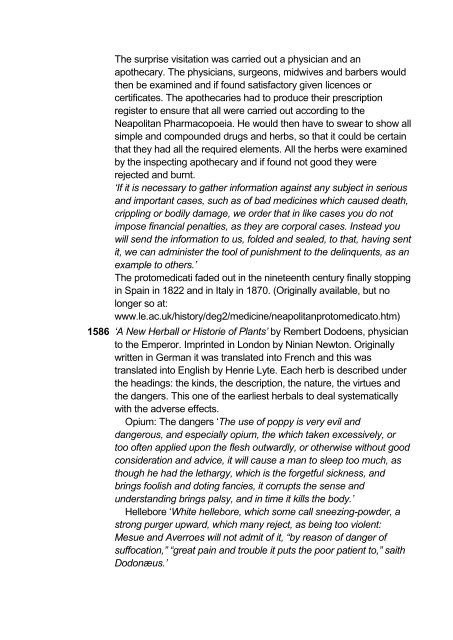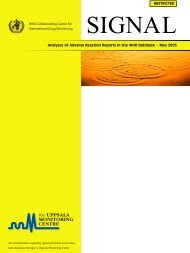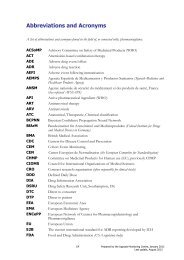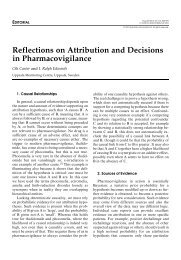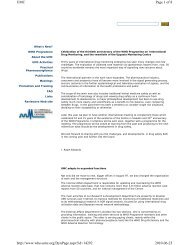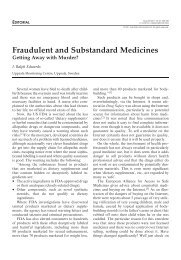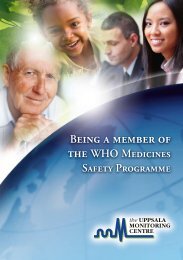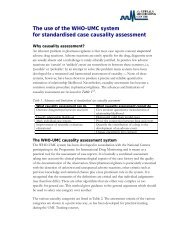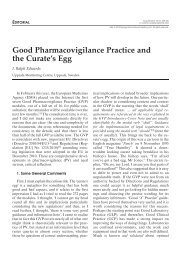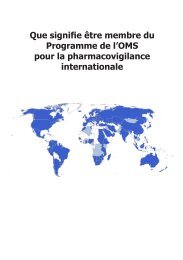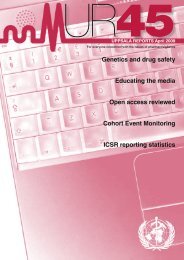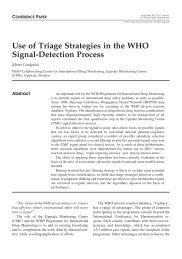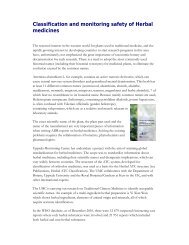- Page 2 and 3:
The Dawn of Drug Safety Myles D B S
- Page 4 and 5:
George Mann Publications Contents
- Page 6 and 7:
§ References .....................
- Page 8 and 9:
Mrs L Lake SRN, SCM for help with t
- Page 10 and 11:
and international bodies play a maj
- Page 12 and 13:
Mechanism of action Causality Predi
- Page 14 and 15:
possible blindness, paralysis of th
- Page 16 and 17:
Filipendula ulmaria or Spiraea ulma
- Page 18 and 19:
2. Laws and Regulations. a. Prevent
- Page 20 and 21:
Algeria, dated 7000-5000 BC, there
- Page 22 and 23:
Sennacharib 11 (705-681 BC), which
- Page 24 and 25:
(henbane), opium and colchicum. (Ma
- Page 26 and 27:
mandragora, mentha, myrrh, opium, p
- Page 28 and 29:
16. Hellebore (alias Christmas Rose
- Page 30 and 31:
clothes and head-bindings, and thei
- Page 32 and 33:
ecovered after a dose of a drug.’
- Page 34 and 35:
the Christian era it was well known
- Page 36 and 37:
given at such a time, it is sure to
- Page 38 and 39:
he strewed powdered Henbane, and li
- Page 40 and 41:
The second category of herbs was ca
- Page 42 and 43:
1 st quarter of the 2 nd century AD
- Page 44 and 45: The Dark Ages from the 5th to the 8
- Page 46 and 47: ecomes disordered, his tongue swell
- Page 48 and 49: inspected at any time without warni
- Page 50 and 51: done on any “new” product: 1. T
- Page 52 and 53: drugs. It represents the first gove
- Page 54 and 55: not written in the form of tables.
- Page 56 and 57: idea of four humours: blood (sangui
- Page 58 and 59: ordered pharmacists to prepare drug
- Page 60 and 61: No mention of side effects. 1270 A
- Page 62 and 63: population was approximately 6 mill
- Page 64 and 65: ed as blood, red wine, Then would h
- Page 66 and 67: time of his death in 1534 in three
- Page 68 and 69: 1497 Syphilis broke out for the fir
- Page 70 and 71: 1686 Stockholm ‘Pharmacopoeja Hol
- Page 72 and 73: drugs, from the shores of the Red S
- Page 74 and 75: medical tracts from Avicenna, Razie
- Page 76 and 77: all manner of creatures of God crea
- Page 78 and 79: powders of myrrh, of mastic, of cer
- Page 80 and 81: swollen in the interior, that first
- Page 82 and 83: mercury is the special best remedy
- Page 84 and 85: 78 Uncomes = whitlows will use it i
- Page 86 and 87: nightshade; but not without great e
- Page 88 and 89: may be chosen the best and most luc
- Page 90 and 91: ‘A New Herball: Wherein are conta
- Page 92 and 93: such an enmity with blood of man.
- Page 96 and 97: nature of it, unto this may be adde
- Page 98 and 99: sometimes they so trouble the brain
- Page 100 and 101: as you will use, and boil it 6. or
- Page 102 and 103: Dose filthy; and much more after a
- Page 104 and 105: Dichotomy In all people there is so
- Page 106 and 107: it Venom, Venom! Poison, say they (
- Page 108 and 109: or the dominions beyond thereof.’
- Page 110 and 111: Quinsy = tonsillitis Spotted fever
- Page 112 and 113: 1652 Culpeper, Nicholas, (1616-1654
- Page 114 and 115: Figure 7. The Expert Doctor’s Dis
- Page 116 and 117: themselves with brawling and alterc
- Page 118 and 119: principles of the art of physick’
- Page 120 and 121: Poisons upon Animals, etc.’ Made
- Page 122 and 123: First medical journal ‘Medicina C
- Page 124 and 125: Closed in 1725 (Warren, http://www.
- Page 126 and 127: for each drug especially for helleb
- Page 128 and 129: hurry of the spirits, causes rest a
- Page 130 and 131: 3. 1736 Frederich Hoffmann wrote th
- Page 132 and 133: Francois Chicanneau. This contains
- Page 134 and 135: can only be obtained by a just acqu
- Page 136 and 137: Pills about him, left Gilbert Jones
- Page 138 and 139: George Key wrote ‘A dissertation
- Page 140 and 141: sometimes excites convulsions.’ H
- Page 142 and 143: drugs’ said of henbane: ‘The bl
- Page 144 and 145:
ut it would not become generally us
- Page 146 and 147:
hiccoughs*; convulsions; syncopes,
- Page 148 and 149:
avec leurs antidotes; rédigée d
- Page 150 and 151:
1780). 1781 ‘Observations on the
- Page 152 and 153:
emarked that it was a violent medic
- Page 154 and 155:
Figure 8 Arsenic © Wellcome Images
- Page 156 and 157:
oppression of the breast, fever, he
- Page 158 and 159:
of former authors on these points i
- Page 160 and 161:
Vernor and Hood, London, 1798. ‘I
- Page 162 and 163:
Vaccines pharmacovigilance data. Wh
- Page 164 and 165:
that I can find where the phrase
- Page 166 and 167:
Physician/scientist Drug taken ADRs
- Page 168 and 169:
Physician/scientist Drug taken ADRs
- Page 170 and 171:
Chapter 7. 19 th Century A lchemy h
- Page 172 and 173:
White Hellebore: ‘violent purging
- Page 174 and 175:
medicine as potentized development
- Page 176 and 177:
vomiting, increase discharge of uri
- Page 178 and 179:
How many patients have they lost? H
- Page 180 and 181:
diarrhoea…If plentifully prescrib
- Page 182 and 183:
1841 Sir Astley Cooper gave the eff
- Page 184 and 185:
The UK House of Commons Select Comm
- Page 186 and 187:
Kolbe and Lautemann made synthetic
- Page 188 and 189:
predisposition that one cannot call
- Page 190 and 191:
this it may be noted that the major
- Page 192 and 193:
emulsion. To the strained emulsion,
- Page 194 and 195:
eruptions. The first study of a dru
- Page 196 and 197:
‘It presents several advantages o
- Page 198 and 199:
as the charlatans continued to flou
- Page 200 and 201:
digoxin. It was not until the explo
- Page 202 and 203:
eported in Australia as early as th
- Page 204 and 205:
1907 Synthesis of arsphenamine (Sal
- Page 206 and 207:
The bill was strongly opposed by th
- Page 208 and 209:
James McDonagh, referring to Salava
- Page 210 and 211:
erythema, spasmodic coryza, an atta
- Page 212 and 213:
their confidence. Certainly the med
- Page 214 and 215:
1935 First use of prontosil red (su
- Page 216 and 217:
groups admitted patients on alterna
- Page 218 and 219:
These postulates governed toxicolog
- Page 220 and 221:
some of the herbs: hellebore, hemlo
- Page 222 and 223:
and treatment. It deals with methyl
- Page 224 and 225:
USA, because less than 1% of new co
- Page 226 and 227:
1981). Dr Kelsey said at an open pu
- Page 228 and 229:
Germany, particularly for use in ch
- Page 230 and 231:
must be due to some recently introd
- Page 232 and 233:
This of course will add to more rap
- Page 234 and 235:
1878) The latter being urticaria. 1
- Page 236 and 237:
Poison the cow-pox, that the dispos
- Page 238 and 239:
Persistence of drugs As explained a
- Page 240 and 241:
have and have not had an exposure t
- Page 242 and 243:
types of reactions: Lewin’s ‘Th
- Page 244 and 245:
knowledge of medicine and science.
- Page 246 and 247:
scurvy in 12 patients, i.e. two pat
- Page 248 and 249:
Mouth and throat tingling/burning o
- Page 250 and 251:
s Sneezing (nasal use) 1586A,1657,
- Page 252 and 253:
types of hellebore. There was a gap
- Page 254 and 255:
1546, 1565, 1752, 1789 Troubles in
- Page 256 and 257:
Weakness 873, 1763, 1652, x x x Hea
- Page 258 and 259:
‘maketh man mad and foolish’ co
- Page 260 and 261:
Mixtures: Donovan’s solution (Liq
- Page 262 and 263:
Swollen tongue Ulceration of gums 1
- Page 264 and 265:
Polyneuropathy enemy of the nerves
- Page 266 and 267:
Headache 1711, 1733 1736, 1752 1788
- Page 268 and 269:
1806 Cough 1590, 1804 1806 x Conjun
- Page 270 and 271:
The loss of hair has only been repo
- Page 272 and 273:
the responsible organism, Treponema
- Page 274 and 275:
Loss of memory 1586, 1619,1763 x Im
- Page 276 and 277:
Antidiuretic effect 1776 urine inse
- Page 278 and 279:
Nausea/vomiting # 1876 2,81,19 , 18
- Page 280 and 281:
alkalosis * 1949 26 Hypoglycaemia 1
- Page 282 and 283:
Drowsiness 1881 28 , 1884 86 , 1909
- Page 284 and 285:
Papilloedema 1965 37 , 1965 37 Myop
- Page 286 and 287:
Pancytopenia 1966 32 VI 1968 F D Me
- Page 288 and 289:
SED = Meyler’s Side Effects of Dr
- Page 290 and 291:
29. Williams JO, Mengel CE, Sulliva
- Page 292 and 293:
Aspirin. 57. Al-Abbasi AH. Salicyla
- Page 294 and 295:
282. Headache, giddiness, tinnitus,
- Page 296 and 297:
ullous eruption < 1 % and purpura.
- Page 298 and 299:
dose Aspirin produces generally its
- Page 300 and 301:
Douthwaite and Lintott first showed
- Page 302 and 303:
Chapter 14. Streptomycin treptomyci
- Page 304 and 305:
1946 September 28 th 1946 November
- Page 306 and 307:
1947 Forty patients. Dose 3.0 gm da
- Page 308 and 309:
cheeks, & the blood kept coming up
- Page 310 and 311:
‘By far the most important toxic
- Page 312 and 313:
In their study 1.6% of patients dis
- Page 314 and 315:
Renal dysfunction Vision- Yellow Di
- Page 316 and 317:
(Crofton, 2009). Asthma, pancytopen
- Page 318 and 319:
Ideal knowledge of an ADR How much
- Page 320 and 321:
Table 13. Number of first reports o
- Page 322 and 323:
Despite these actions the prescribe
- Page 324 and 325:
Remedy, the active ingredient was D
- Page 326 and 327:
on the lips (Thorwald, 1962) Uses:
- Page 328 and 329:
Comment: the side effects were seve
- Page 330 and 331:
SED 1952: habituation causes sympto
- Page 332 and 333:
and acuity, dementia, inability to
- Page 334 and 335:
have expected that it would have be
- Page 336 and 337:
the poor economic status of these a
- Page 338 and 339:
SED 1952: no mention. A warning was
- Page 340 and 341:
Withdrawn: over-the-counter sales w
- Page 342 and 343:
(ADEC, 1971). It is unlikely that c
- Page 344 and 345:
dose for six months, mice also deve
- Page 346 and 347:
symptoms.’ (Willcox, 1934). SED 1
- Page 348 and 349:
Comment: a Lancet editorial entitle
- Page 350 and 351:
1933 Dinitrophenol (2,4-dinitrophen
- Page 352 and 353:
1995). SED 1952: the same side effe
- Page 354 and 355:
Delay in recognition: None Delay in
- Page 356 and 357:
In 1958 Garrod reported an approxim
- Page 358 and 359:
purpura, toxic hepatitis, and aplas
- Page 360 and 361:
area and degree of inflammation. 19
- Page 362 and 363:
1952 Iproniazid (Marsilid) Was intr
- Page 364 and 365:
SED 1960: addiction frequently obse
- Page 366 and 367:
cutaneous sarcoidosis, erythema mul
- Page 368 and 369:
1957 Ethchlorvynol (Placidyl, Seren
- Page 370 and 371:
Official warnings were sent out in
- Page 372 and 373:
Delay in recognition: ≤ one year
- Page 374 and 375:
Withdrawn: USA 1962 Availability: n
- Page 376 and 377:
new original reports. Table 16. Num
- Page 378 and 379:
eporting (Griffin & Weber, 1986), b
- Page 380 and 381:
John Abraham and Helen Lawton Smith
- Page 382 and 383:
and nialamide; biguanides, e.g. buf
- Page 384 and 385:
see Hart PW in ‘Blood dyscrasias
- Page 386 and 387:
used in 1779 with reference to toba
- Page 388 and 389:
perhaps even stranger that there we
- Page 390 and 391:
of benefit to me.’ The first rule
- Page 392 and 393:
government authority including perf
- Page 394 and 395:
4) There was less risk of having an
- Page 396 and 397:
adverse effects more willingly. Now
- Page 398 and 399:
to restrict or withdraw a drug. ‘
- Page 400 and 401:
Armer RE and Morris ID. Trends in e
- Page 402 and 403:
Brookes R. (Richard). An introducti
- Page 404 and 405:
www.ordre.pharmacien.fr/upload/Synt
- Page 406 and 407:
of prescription drugs from worldwid
- Page 408 and 409:
Herbst Al, Vilfelder H and Posakanz
- Page 410 and 411:
Kereković M and Curković M. Olfac
- Page 412 and 413:
Med 2008;101: 148-155. Louis PCA. R
- Page 414 and 415:
MRC. At National Archives: FD1/6769
- Page 416 and 417:
Reynolds TB, Lapin AC, Peters RL an
- Page 418 and 419:
Solecki RS. Shanidar IV, a Neandert
- Page 420 and 421:
Vépan. Gaz Medic. De Strassb. 1865


